Wildflowers
Showing 1–24 of 133 results
Native wildflowers in an assortment of shapes and colors make excellent sources of nectar and pollen for butterflies, bees, hummingbirds, and other pollinators. Local and migrating birds also enjoy the seeds and insects found on wildflowers. From shade-lovers to popular, showy herbaceous perennials, there’s a plant for every sun exposure, soil moisture, and soil type.
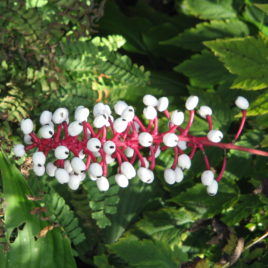
Actaea pachypoda
White Baneberry, or Actaea pachypoda, is also known as Doll’s Eyes and can grow up to two feet tall. White Baneberry is best grown in moist, well-drained soils in part sun to full shade. The herbaceous perennial produces white fruit, … Continued
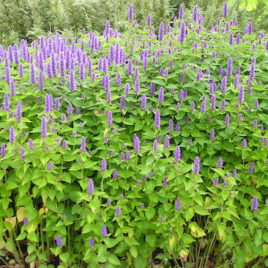
Agastache foeniculum
Agastache foeniculum, or Anise Hyssop, is a 2-3 foot perennial member of the mint family. Anise Hyssop’s leaves produce a strong anise or licorice scent when crushed, and its bluish-purplish flowers appear in July through September. The plant grows in … Continued
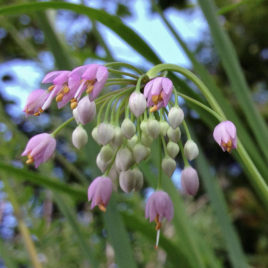
Allium cernuum
Allium cernuum, or Nodding Onion, is a 1-2 foot, attractive allium with white to pink nodding flowers on 2’ stalks. Nodding Onion thrives in full sun to part sun in moderately rich to stony soils from July to August. Plant … Continued
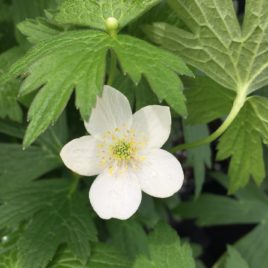
Anemone canadensis
Anemone canadensis, or Canada Anemone, is a 1-2 foot perennial that prefers the full sun to part shade with moist soil. Canada Anemone acts as a great ground cover and features deep green foliage covered with white, cup-shaped flowers in … Continued
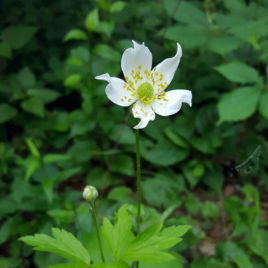
Anemone virginiana
Anemone virginiana, or Tall Thimbleweed, is a 2-4 foot perennial member of the Buttercup family. It grows in full sun to shade and in average to dry soils. Tall Thimbleweed’s leaves are strongly veined with distinct stalks. Tall Thimbleweed produces … Continued
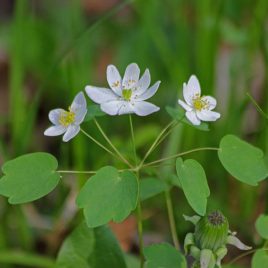
Anemonella thalictroides
Anemonella thalictroides, or Rue Anemone, is an early spring plant with delicate white blooms growing in well-drained soil. Rue Anemone is perfect for shaded areas of a rock garden or as an underplanting for shrubs. Anemonella thalictroides is also known … Continued
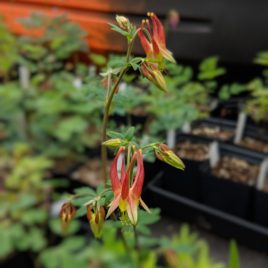
Aquilegia canadensis
Aquilegia canadensis, or Columbine, is a classic woodland wildflower with lacy blue-green foliage and beautiful red and yellow flowers. Hummingbirds flock to its flowers, and it reseeds itself freely.
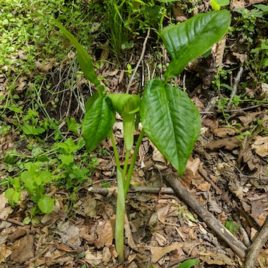
Arisaema triphyllum
Arisaema triphyllum, or Jack-in-the-Pulpit, is a spring woodland flower growing in various conditions, but it thrives in moist, shady locations. Jack-in-the-Pulpit is composed of three-parted leaves and flowers in a spadix covered by a hood. Once established, this plant is … Continued
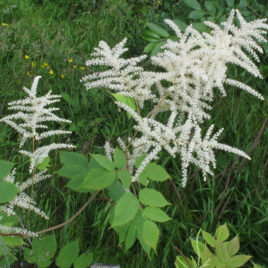
Aruncus dioicus
Aruncus dioicus, or Goat’s Beard, is a perennial member of the rose family growing in moist woods, meadows, and along streams. Goat’s Beard is a very showy plant growing 3 to 5 feet tall in large bushy clumps. The plant … Continued
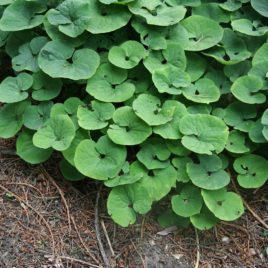
Asarum canadense
Asarum canadense, or Wild Ginger, is a six-inch tall, woodland, perennial ground cover plant for shady, medium moist, humus-rich soils. Wild Ginger features red cup-shaped flowers hidden below green heart-shaped leaves that arrive in early summer.
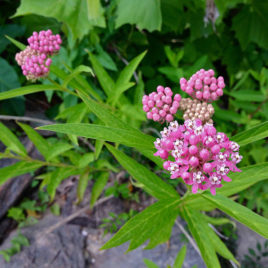
Asclepias incarnata
Asclepias incarnata, or Red Milkweed, is a 3-5 foot perennial perfect for full sun and moist to wet soils. Red Milkweed, or Swamp Milkweed, blooms with reddish flowers from June to July. Its leaves are the preferred food of Monarch … Continued
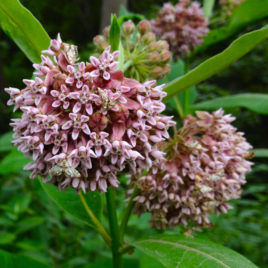
Asclepias syriaca
Asclepias syriaca, or Milkweed, is a herbaceous perennial with pink flowers serving as a great nectar source for butterflies. Its leaves are a food source for Monarch butterfly larvae. Milkweed, or Common Milkweed, is easily grown in average, dry to … Continued
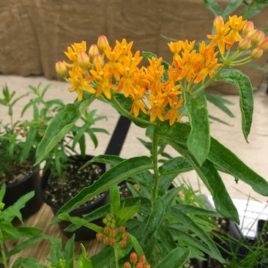
Asclepias tuberosa
Asclepias tuberosa, or Butterfly Milkweed is a 1-2 foot dazzling member of the Milkweed family. Butterfly Milkweed leaves are lance-shaped, and its flowers are a brilliant orange. Preferring dry to medium, well-drained soils in full sun, Butterfly Milkweed appears from … Continued
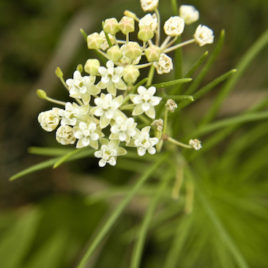
Asclepias verticillata
Asclepias verticillata, or White Milkweed, is a deep-rooted perennial with small greenish-white flowers blooming in small clusters between July to August. The late-blooming milkweed makes it a valuable late-season food source for Monarch butterflies and their caterpillars.
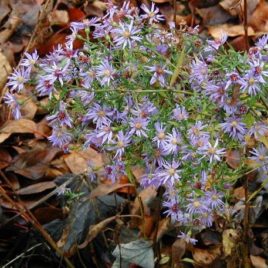
Aster cordifolius
Aster cordifolius, or Blue Wood Aster, is a 2-3 foot perennial for partially shaded sites in dry or moist soil. Blue Wood Aster is often found at the edge of woods with clouds of blue flowers appearing in early fall. … Continued
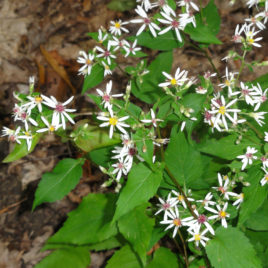
Aster divaricatus
Aster divaricatus, or White Wood Aster, is a low mounding, rhizomatous perennial that is typically the first aster to bloom in late summer. White Wood Aster produces white ray flowers with light pink centers that are sure to brighten your … Continued
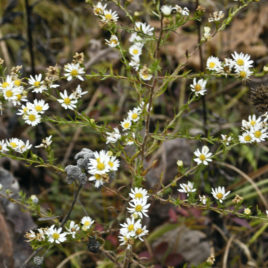
Aster ericoides
Aster ericoides, or Heath (White) Aster, is a 2-3 foot perennial for full sun, well-drained soils. Heath (White) Aster has very prolific tiny white flowers that appear in late summer to early fall. It is also a great butterfly food … Continued
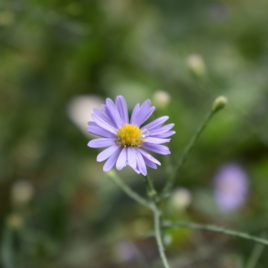
Aster laevis
Aster laevis, or Smooth Blue Aster, is a 2-4 foot hardy perennial for full to part sun and dry to medium moist soils. Smooth Blue Aster has leaves and stems with a pale glaucous bloom and deep blue flowers appearing … Continued
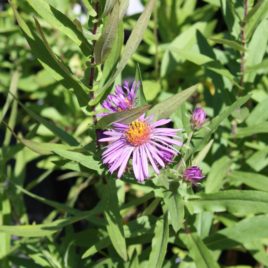
Aster novae-angliae
Aster novae-angliae, or New England Aster, is a 3-5 foot perennial for full to part sun and moist, damp soils. New England Aster’s very showy, deep violet to purple flowers appear in late summer to early fall. It is a … Continued
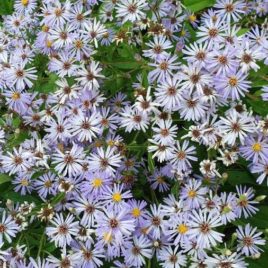
Aster novi-belgii
Aster novi-belgii, or New York Aster, is a sturdy, clump-forming perennial with lance-shaped leaves and rings of purple or pink flowers surrounding yellow disc centers. It typically produces more blooms than New England Aster. New York Aster thrives in moist, … Continued
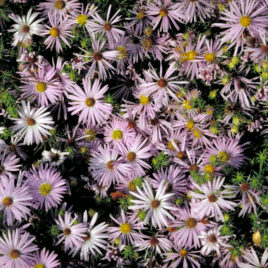
Aster oblongifolius
Aster oblongifolius, or Aromatic Aster, is a 1-2 foot perennial for full sun to part shade and medium to dry, well-drained soils. The perennial is very drought tolerant. The branching stems of Aromatic Aster feature violet flowers with yellow centers … Continued
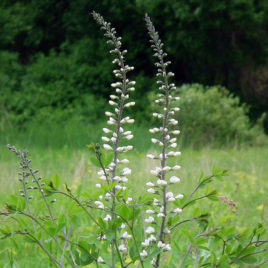
Baptisia alba
Baptisia alba, or White Wild Indigo, is a 2-4 foot, long-lived herbaceous perennial that prefers full to part sun and dry to medium, moist soils. Although White Wild Indigo tolerates poor soils. All Baptisia species are nitrogen-fixing legumes, meaning they … Continued
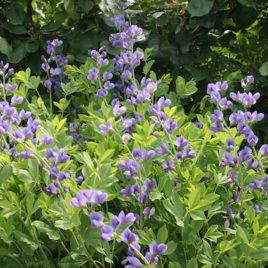
Baptisia australis
Baptisia australis, or Blue Wild Indigo, is a 3-5 foot, hardy, long-lived perennial legume for full sun to light shade and well-drained medium moist soils. The attractive, dark blue flowers and glossy blue-green trifoliate leaves on Blue Wild Indigo bloom … Continued
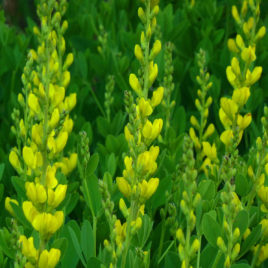
Baptisia tinctoria
Baptisia tinctoria, or Yellow Wild Indigo, is a shrub-like perennial with silvery, gray-green leaves and bright pea-shaped flowers in late spring. The plant grows best in full sun or part sun. Young plants tend to get off to a slow … Continued

